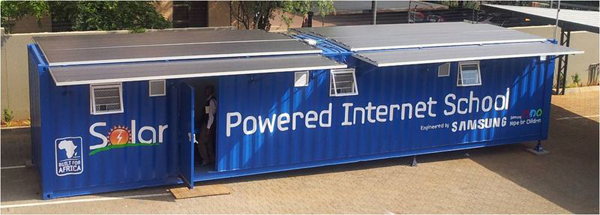Samsung is tackling the problem of lack of education in Africa in a simple but stunning and inspiring way. The tech company launched its Samsung’s Internet Schools Programme, which brings “technology-rich learning and teaching” K-12 classrooms to distant and rural regions of the countries. Through the initiative, the brand aims to foster education in poorest regions using the most cost-efficient, but effective and sustainable technologies—the new classrooms are opened in old shipping solar-powered renovated containers.
“The programme focuses on the deployment of ICT Infrastructure like the Samsung Interactive Whiteboard, commonly called E-board, the multi-purpose Samsung printer and Note PCs—as well as comprehensively on infrastructure deployment, professional development of educators, content development and management, school administration and management as well as sharing best practices in the integration of ICTs in enhancing learning,” says the brand. This is only a pilot, as the company is going to expand the programme to more countries in the coming years. Launched in late 2011, the project has been recognized as the African Solar Project of the Year by the Africa Energy Awards and has already expanded to include South Africa, Kenya, Nigeria, Senegal and Sudan. Samsung plans to reach 2.5 million students by 2015 with the initiative.
Photo: Samsung solar powered Internet schools (click to enlarge), www.samsungvillage.com
Such 12-meter classrooms can “accept” up to 21 learners at one time, who get access to technology behind their new desks—for many of the students, it’s the first time they can use computers and surf the web and get access to the educational content. For the initiative, Samsung has teamed up with local teachers, content developers and school administration to create programmes to deliver maximum effect using a range of technological devices, ranging from 50-inch electronic board (which allows video conferencing, distant learning, etc.) to solar-powered notebooks with an Internet connection, Samsung Galaxy tablets and Wi-Fi cameras.
Samsung is joining Skype, Intel and YouTube, which launched a plethora of educative initiatives, in their attempt to foster African youth’s better integration in the learning process.
